Super User
Stora Enso survey finds physical books still outperform e-books in share of hearts and minds, with carbon neutrality a big consideration.
A new survey commissioned by Stora Enso in March 2022 among 2,400 book readers and listeners in the UK, France, Germany and the US showed that people still overwhelmingly prefer physical books (65%) to e-books (21%) or audiobooks (14%). And consumers are willing to pay a premium for carbon neutral books.
“With the book market strong coming out of the pandemic, our goal with this survey was to gain insights into whether the market would stay that way in a post-pandemic world. And the answer we got was a resounding yes,” says Jonathan Bakewell, VP, Head of Segment Office and Book Papers, Stora Enso.
Pandemic reinforced reading
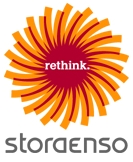 Clearly the pandemic had a positive effect on reading, with 63% of all respondents and nearly 70% in the UK and US, saying they read more. Of the youngest group polled (16 to 24 years), 64% said they read more, notably 76% of young people in the US and 73% in the UK.
Clearly the pandemic had a positive effect on reading, with 63% of all respondents and nearly 70% in the UK and US, saying they read more. Of the youngest group polled (16 to 24 years), 64% said they read more, notably 76% of young people in the US and 73% in the UK.
The demand among youth seems partially fuelled by the manga-book craze, driven by Netflix anime series as well as an explosion in top-selling teen romance books. For older readers the book market saw a rise in human potential books and mindfulness as people took pause to look inward. But mostly people said they read or listened to fiction books, mostly for leisure time alone. And the trend looks set to continue.
Why physical books?
The 65% preferring physical books cite their haptic properties. “In addition to being an object of beauty, the physicality of a book feels companionable,” Bakewell says, “Even the smell of a book can evoke pleasant memories for some readers.”
Books and the paper they are printed on are also circular, and renewable – 42% of readers said they like to keep books when they finish reading them, while 26% loan or donate them. A further 26% sell their books and the remaining 5% recycle or discard them. And while books do emit carbon during production and distribution, they are their own carbon storage unit once they are on the shelves.
Place for all formats
While physical books look set to stay dominant, the survey showed there is a time and place for all book formats, with few respondents saying they stuck to just one. E-books and audio books are convenient, light to carry and can be consumed from many different devices.
Valuing low carbon
Carbon neutrality was high on the agenda for most, with 61% of all respondents and 70% of youth saying they would pay more (on average 5.7% of the retail price) for carbon neutral books. A majority would also buy from an outlet that provided carbon neutral or carbon offset books.
“These findings among many others are making for good conversation starters with our printer and publishing customers,” Bakewell says, “as we begin to figure out as an industry how to best meet the demand for carbon neutrality.”
Part of the global bioeconomy, Stora Enso is a leading provider of renewable products in packaging, biomaterials, wooden construction and paper, and one of the largest private forest owners in the world. We believe that everything that is made from fossil-based materials today can be made from a tree tomorrow. Stora Enso has approximately 22,000 employees and our sales in 2021 were EUR 10.2 billion. Stora Enso shares are listed on Nasdaq Helsinki Oy (STEAV, STERV) and Nasdaq Stockholm AB (STE A, STE R). In addition, the shares are traded in the USA as ADRs (SEOAY).
Fully recyclable Rice Box champions sustainability in sector
DS Smith has partnered with Veetee to create a sector-leading, fully recyclable Rice Box with the aim of removing over 50 tonnes of problem plastic
Delivering sustainable packaging with optimal consumer convenience significantly increases a brand’s chance of standing out on the shelf. Veetee Rice Ltd’s dry rice pack is a sector-leading solution that removes the need to use plastic bags or standard skillets in its packaging, with a box lid that can be removed, used as a measure, and then reseals the pack for ease of storage.
As one of the UK’s largest rice companies, Veetee’s pioneering solution is a fully recyclable fibre-based rice box with a unique portion measure and was created by DS Smith who works closely with their customers to support the removal of problem plastics from supermarket shelves.
The innovative solution reinforces both companies’ position as sector leaders in plastic replacement, as the fully fibre-based box replaces existing plastic bag options currently on the market and aims to remove over 50 tonnes of plastic from the UK market.
FTSE 100 sustainable packaging company DS Smith worked closely with Veetee and its design brief to create a product that is not only friendlier on the environment but makes it simple for customers to measure portions using a replaceable box lid. The concept of incorporating the portion measure is unique to the sector, solving a consumer problem and helping the brand to stand out from its competitors.
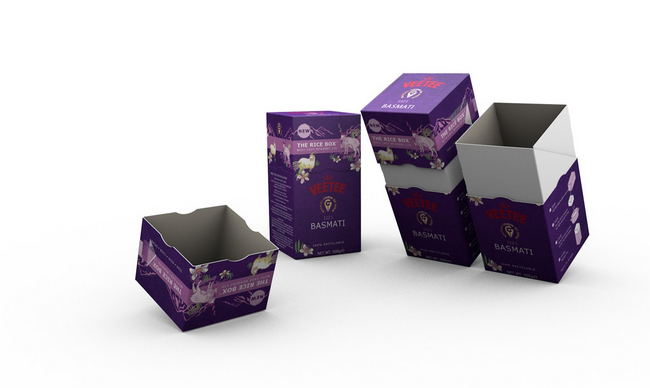
Dave Ellerington, Head of Design & Innovation and Business Development at DS Smith Packaging UK & Ireland said: “It’s been excellent to work with Veetee who share our goal of reducing the use of harmful plastics and giving consumers truly sustainable options. We were able to use our unique circular design principles and metrics in the development of this design to ensure the final product is convenient for customers as well as being sustainable.
“Our work with Veetee has once again been able to show how packaging is vital for brands who are looking to become more circular and reduce their environmental impact”.
James Brett, Marketing Director for Veetee Group said: “Working with DS Smith to create our industry-leading rice box has allowed us to achieve our goal of selling our product that is a premium, sustainable solution and disruptive on the shelf. We’re also proud to be providing an enhanced customer experience through the box’s unique portion measure, meaning the packaging helps our brand stand out from the crowd”.
The pack has been developed to be filled on Veetee’s fully automated packing lines and within its existing footprint to maximise and improve supply chain efficiency. Following design, development, and manufacturing in the UK, the rice box was first launched in the US in May 2021 before being sold in major UK supermarkets.
CASE STUDY
Market-first rice box champions sustainability in sector
DS Smith has partnered with Veetee to remove over 50 tonnes of problem plastic with innovative fully recyclable fibre-based rice box
Veetee Rice Ltd – one of the largest rice companies in the UK, supplying rice to major supermarkets and exporting internationally to over 50 countries – has partnered with DS Smith to create packaging that optimises consumer convenience and helps it stand out on supermarket aisles, whilst designing-out unnecessary plastics.
Veetee sought to introduce several new features to their packaging design including developing a premium dry rice pack for supermarkets, replacing plastic bags with a carton board pack and ensuring the carton was leak-proof and stable when being filled on Veetee’s automated packing lines.
In collaboration with Veetee, DS Smith’s technical and operational experts went through a series of design developments. The final product successfully designed-out the need for plastic bags and created a lid that doubled up as a portion measure, which is unique in the sector.
The concept of incorporating the portion measure solves a consumer problem and helps Veetee to stand out from its competitors. The new packaging design – which is a fully recyclable fibre-based box –aims to remove more than 50 tonnes of plastic from the UK market and demonstrates DS Smith’s continued expertise in replacing problem plastic.
Dave Ellerington, Head of Design & Innovation and Business Development at DS Smith Packaging UK & Ireland said: “Reducing the volume unnecessary plastics in circulation and giving consumers truly sustainable options are two goals that we share with Veetee. We used our unique circular design principles in the development of this solution, to ensure the final product would maintain and optimise materials whilst being fully recyclable.
“Our work with Veetee has once again highlighted why packaging cannot be overlooked by brands looking to reduce their environmental impact. It’s really satisfying knowing that our solution will remove over 50 tonnes of problem plastic from circulation, avoiding further waste being sent to landfill or ending up in our environment.”
James Brett, Marketing Director for Veetee Group said: “Working with DS Smith to create our market-first rice box has allowed us to achieve our goal of selling a product that is not only premium, but disruptive and sustainable. We’re proud to be providing an enhanced customer experience as the only brand to include a portion measure within the packaging’s design.”
The rice box has been developed to be filled on Veetee’s fully automated packing lines and within its existing footprint to maximise and improve supply chain efficiency. The one-piece design enables a high-quality print to be used on the inside and outside of the carton, creating an enhanced customer opening experience. The complex double-skinned construction creates a collar for the lid, whereas most other carton packs are single skinned.
The pack is entirely designed, developed and manufactured in the UK at DS Smith’s Neath site.
For more information on DS Smith, please visit: https://www.dssmith.com/packaging
For more information on Veetee Rice, please visit: https://www.veetee.com/
About DS Smith:
DS Smith is a leading provider of sustainable fibre-based packaging worldwide, which is supported by recycling and papermaking operations. It plays a central role in the value chain across sectors including e-commerce, fast moving consumer goods and industrials. Through its purpose of ‘Redefining Packaging for a Changing World’ and its Now and Next sustainability strategy, DS Smith is committed to leading the transition to the circular economy, while delivering more circular solutions for its customers and wider society – replacing problem plastics, taking carbon out of supply chains and providing innovative recycling solutions. Its bespoke box-to-box in 14 days model, design capabilities and innovation strategy sit at the heart of this response. Headquartered in London and a member of the FTSE 100, DS Smith operates in 34 countries employing around 30,000 people and is a Strategic Partner of the Ellen MacArthur Foundation. Its history can be traced back to the box-making businesses started in the 1940s by the Smith family.
South Florida Tissue Paper chooses Körber Business Area Tissue technologies to expand its business in the retail sector
The rising costs of raw materials and product transport due to reduced imports from the Chinese market are the main variables that are creating price increases with the risk of penalizing sales in the US tissue market, even though, paradoxically, demand in some regions is greater than available local production capacity.
An example of this is Florida, a territory that in recent years has experienced exponential growth in population thanks to an increase in births and greater employment of immigrants.
It’s in this context that South Florida Tissue Paper, a third-generation company founded in Miami in 1997, aims to become the main player not only in the AFH (Away From Home) sector by consolidating its positioning but by expanding its own work in new business areas such as retail tissue.
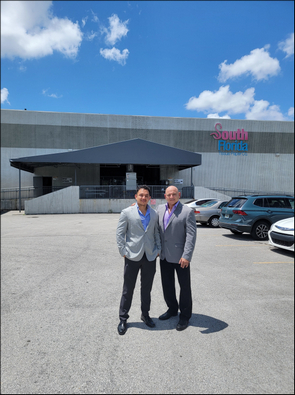 In order to better approach the market, the company needed to have a technology capable of increasing capacity, versatility, and automation at every stage of the conversion process while ensuring a high quality of the finished product. “We were looking for a strategic partner able to understand the logic of the American market, able to offer not only advanced and competitive technologies but 360 ° consultancy that anticipates the needs of the tissue sector. We found all these characteristics in Körber” comments Juan Corzo III, VP of Operations at South Florida Tissue Paper.
In order to better approach the market, the company needed to have a technology capable of increasing capacity, versatility, and automation at every stage of the conversion process while ensuring a high quality of the finished product. “We were looking for a strategic partner able to understand the logic of the American market, able to offer not only advanced and competitive technologies but 360 ° consultancy that anticipates the needs of the tissue sector. We found all these characteristics in Körber” comments Juan Corzo III, VP of Operations at South Florida Tissue Paper.
The perfect solution for the company is the Perini Myline from Körber. This line has been designed for the production of toilet and kitchen paper rolls up to 200 mm, or 8 inches, in diameter, and is capable of handling parent rolls up to 2500 mm, or 98 inches, in diameter at a speed maximum of 600m / min and a production of 40 logs/min.
The Perini Myline is a well-established technology, with more than 60 lines sold around the world since 2016. The Perini Myline rewinder is based on the well-established Sincro exchange phase system. The technology offers the perfect balance between cost and OEE to maximize ROI and guarantees simplicity of operation and easy maintenance. The line is also equipped with a laminator-embosser with 409mm diameter steel rollers, and it is water lamination capable utilizing Körber's Aquabond technology which eliminates the use of glue, making it greener, more efficient, and less expensive.
“With the view of developing our business, we had two different requirements: to select a line that would increase our production capacity and identify a trustworthy partner capable of providing careful and timely technical support. With Körber's Perini Myline we are convinced that we have found a reliable, efficient solution to help us consolidate not only our role in the AFH sector but also to be able to compete in the retail sector. In addition, with Körber Business Area Tissue’s local assistance we can be sure of relying on an experienced partner who is available at any time to provide personal assistance for every need," comments Juan Corzo III.
“Tradition and innovation have always been part of Körber's core business. We believe in the value of relationships and in the constant exchange of information with our customers in order to offer them innovative solutions that can support and diversify their business. We are honoured that South Florida Tissue Paper has chosen Körber Business Area Tissue as a strategic partner to consolidate their presence in the American market and develop their retail business" comments Claudio Muñoz, Marketing Director at Körber Business Area Tissue.
South Florida Tissue Paper
South Florida Tissue Paper Company is a family-owned and operated company that has been providing services and the finest products since its start in 1997 in Miami, FL. Production began with the Jumbo Roll Tissue and the Center Pull Towels which quickly expanded to a diverse variety of paper products for the away-from-home market throughout the years. South Florida Tissue Paper Company provides state-of-the-art paper product fabrication and we are able to control every step of the process from our modern facilities. Our Miami manufacturing facility produces a wide range of paper products and distributes them nationwide as well as internationally to South America, Central America and the Caribbean. With the expansion of South Florida Tissue Paper Company Dominican Republic (Inpaca), we have been able to expand into other markets internationally.
Körber Business Area Tissue
At Körber, our ultimate goal is to empower our customers’ ongoing success. We are the only truly integrated and global provider of advanced solutions for the tissue business. We offer the industry’s most comprehensive portfolio of tissue technology to support customers across the entire value chain — from roll to fold, from converting to packaging. Our advanced, automated, and easy-to-use integrated solutions are a fundamental asset to shape the success in tissue, take our customer's operations to the next level, and strengthen their overall financial performance while optimizing their total cost of ownership.
About Körber
We are Körber – an international technology group with about 12,000 employees, more than 100 locations worldwide and a common goal: We turn entrepreneurial thinking into customer success and shape technological change. In the Business Areas of Digital, Pharma, Supply Chain, Tissue and Tobacco, we offer products, solutions and services that inspire. We act fast to customer needs, we execute ideas seamlessly, and with our innovations, we create added value for our customers. In doing so, we are increasingly building on ecosystems that solve the challenges of today and tomorrow. Körber AG is the holding company of the Körber Group.
Mondi expands capacity in sustainable pet food packaging solutions
Mondi, a global leader in packaging and paper, is investing nearly €65 million in three Consumer Flexibles packaging plants in Europe in order to meet growing customer demand for sustainable pet food packaging solutions. The European pet food market has grown significantly in recent years, driven by a consistent rise in pet ownership. This trend increased during the COVID-19 pandemic and is expected to continue for many years to come.[1]
- Mondi to invest nearly €65 million to meet customers’ growing demand for sustainable packaging solutions.
- Investment strengthens Mondi’s leading position in pet food packaging.
- Production capacity to be increased at three Consumer Flexibles plants in Austria (Mondi Korneuburg) and Germany (Mondi Halle and Mondi Steinfeld).
This project is part of Mondi’s previously announced €1 billion expansionary capital investment programme to accelerate growth in sustainable packaging and will further strengthen its leading position in the pet food packaging market.
Work has already started at Mondi Korneuburg (Austria) and includes investments in new, state-of-the-art machinery and equipment as well as an expanded production area. These changes will lead to a capacity increase, solidifying the site’s position as a market leader in pre-made retort stand-up pouches for wet pet food.
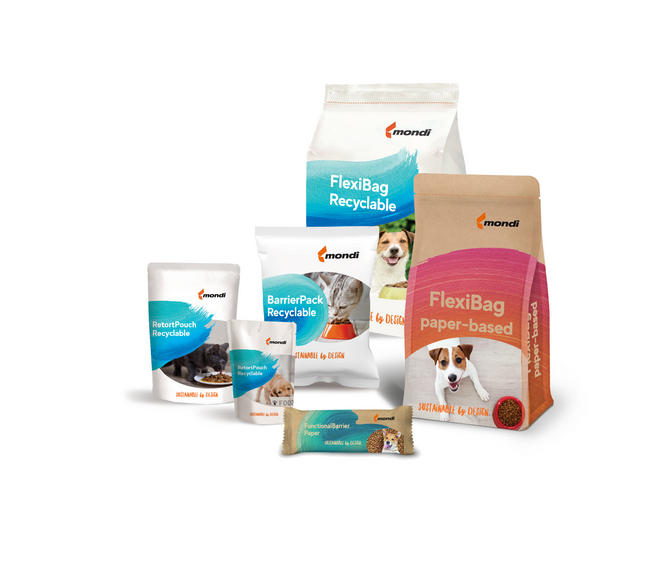
The group is also investing in new, advanced machinery at Mondi Halle and Mondi Steinfeld in Germany, to increase production capacity of sustainable pre-made bag solutions for pet food, as well as home and personal care. This will enable future growth and support customers to switch from multi-layer, non-recyclable packaging to more sustainable alternatives such as mono-material recyclable stand-up pouches and paper-based pre-made bags.
Dirk Gabriel, COO Consumer Flexibles, Mondi says: “We take pride in being an innovative, agile partner for our customers. With this investment, we continue to take the lead in packaging solutions that are sustainable by design, especially in the pet food industry.
This investment also supports our Mondi Action Plan 2030 (MAP2030) sustainability framework which is focused on circular driven solutions, created by empowered people, taking action on climate. With these projects, we’re increasing operational efficiency and reducing our own energy consumption while also connecting our production network.”
[1] Wet pet food demand estimated to grow 5% a year between 2020 and 2025 according to Wood Mackenzie 2020 (PCI).
About Mondi
Mondi is a global leader in packaging and paper, contributing to a better world by making innovative packaging and paper solutions that are sustainable by design. Our business is integrated across the value chain – from managing forests and producing pulp, paper and plastic films, to developing and manufacturing effective industrial and consumer packaging solutions. Sustainability is at the centre of our strategy and intrinsic in the way we do business. We lead the industry with our customer-centric approach, EcoSolutions, where we ask the right questions to find the most sustainable solution. In 2021, Mondi had revenues of €7.7 billion and underlying EBITDA of €1.5 billion.
Mondi has a premium listing on the London Stock Exchange (MNDI), and a secondary listing on the JSE Limited (MNP). Mondi is a FTSE 100 constituent, and has been included in the FTSE4Good Index Series since 2008 and the FTSE/JSE Responsible Investment Index Series since 2007.
Stora Enso and Northvolt partner to develop wood-based batteries
Stora Enso and Northvolt are joining forces to create sustainable batteries using lignin-based hard carbon produced with renewable wood from the Nordic forests. The aim is to develop the world’s first industrialised battery featuring anode sourced entirely from European raw materials, lowering both the carbon footprint and the cost.
The companies have entered into a Joint Development Agreement to create a sustainable battery featuring anode produced from renewable raw materials sourced sustainably and locally in the Nordic countries.
“The joint battery development with Northvolt marks a step on our journey to serve the fast-growing battery market with renewable anode materials made from trees. Our lignin-based hard carbon, Lignode® by Stora Enso, will secure the strategic European supply of anode raw material, serving the sustainable battery needs for applications from mobility to stationary energy storage,” says Johanna Hagelberg, Executive Vice President for Biomaterials at Stora Enso.
Both companies bring key components, competence, and expertise to the battery partnership. Stora Enso will provide its lignin-based anode material Lignode, originating from sustainably managed forests, while Northvolt will drive cell design, production process development and scale-up of the technology.
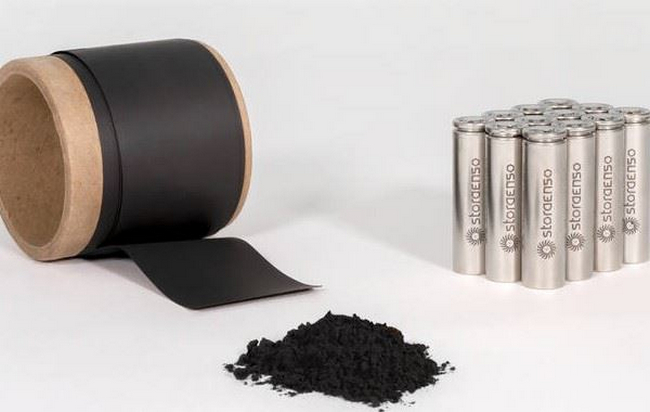
“With this partnership, we are exploring a new source of sustainable raw material and expanding the European battery value chain, while also developing a less expensive battery chemistry. It is an exciting demonstration of how our pursuit of a sustainable battery industry goes hand-in-hand with creating a positive impact both on society and cost,” says Emma Nehrenheim, Chief Environmental Officer at Northvolt.
Lignin is a plant-derived polymer found in the cell walls of dry-land plants. Trees are composed of 20–30% of lignin, where it acts as a natural and strong binder. It is one of the biggest renewable sources of carbon anywhere.
Stora Enso’s pilot plant for bio-based carbon materials is located at the Group’s Sunila production site in Finland, where lignin has been industrially produced since 2015. The annual lignin production capacity is 50,000 tonnes, making Stora Enso the largest kraft lignin producer in the world. The Group is also evaluating its first industrial production of Lignode at the Sunila site through a feasibility study.
Northvolt is a European supplier of sustainable, high-quality battery cells and systems. Founded in 2016 to enable the European transition to a decarbonized future, the company has made swift progress on its mission to deliver the world’s greenest lithium-ion battery with a minimal CO2 footprint and has grown to over 3,000 people from over 100 different nationalities. Northvolt has to date secured more than $55 billion worth of contracts from key customers, including BMW, Fluence, Scania, Volkswagen, Volvo Cars and Polestar, to support its plans, which include establishing recycling capabilities to enable 50 percent of all its raw material requirements to be sourced from recycled batteries by 2030.
Part of the global bioeconomy, Stora Enso is a leading provider of renewable products in packaging, biomaterials, wooden construction and paper, and one of the largest private forest owners in the world. We believe that everything that is made from fossil-based materials today can be made from a tree tomorrow. Stora Enso has approximately 22,000 employees and our sales in 2021 were EUR 10.2 billion. Stora Enso shares are listed on Nasdaq Helsinki Oy (STEAV, STERV) and Nasdaq Stockholm AB (STE A, STE R). In addition, the shares are traded in the USA as ADRs (SEOAY). www.storaenso.com
A.Celli Paper will supply a paper rewinder for the RDM Group mill in Blendecques
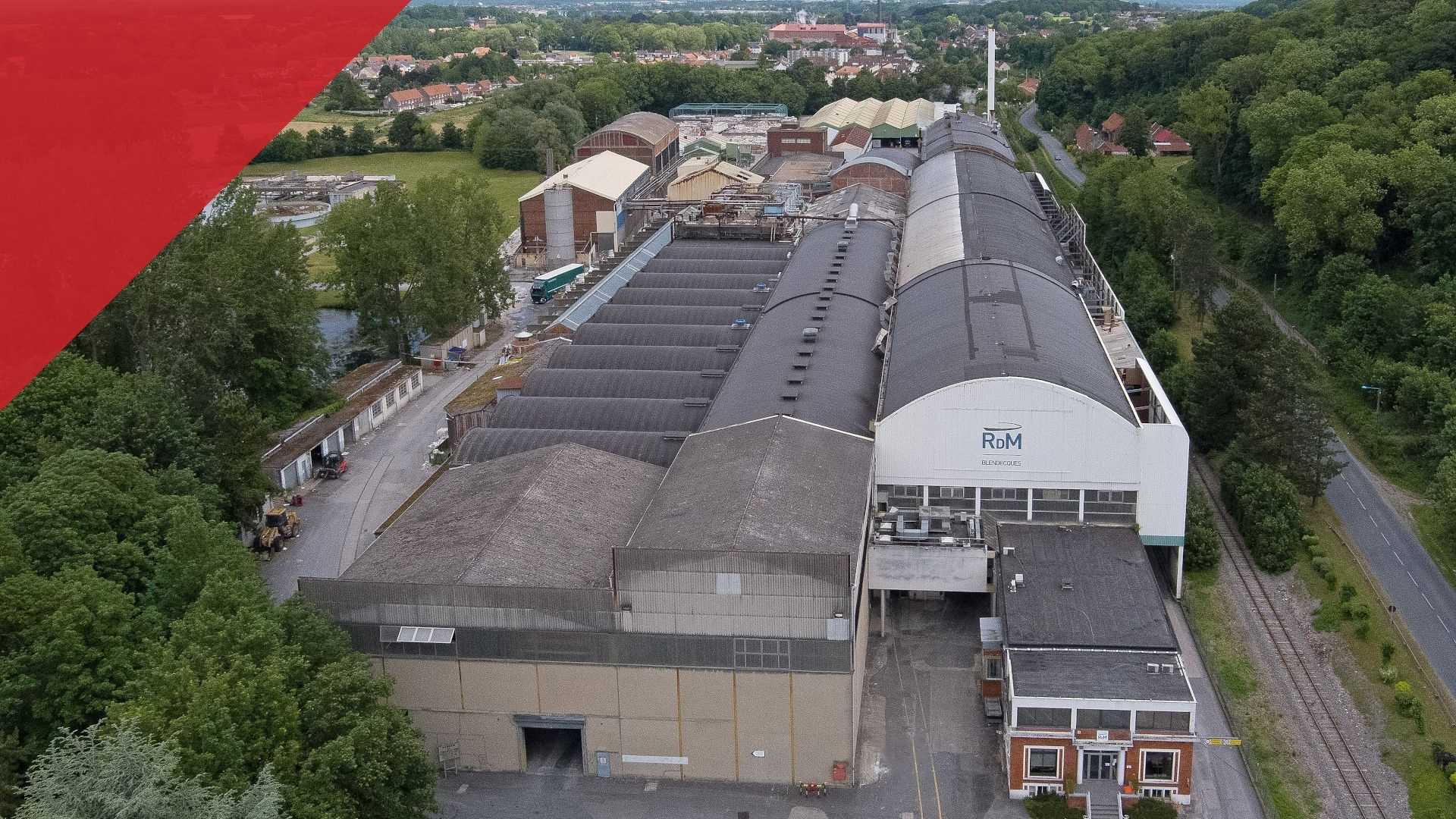
RDM GROUP – COMPANY PROFILE
RDM Group is the leading producer in the recycled cartonboard business and the largest producer in Italy, France, the Netherlands and in the Iberian Peninsula. The Group has its headquarters in Milan but it can boast a strategic presence at international level thanks to its sales network and its 9 production mills - 3 in Italy, 1 in France, 1 in Germany, 2 in Spain and 2 in the Netherlands. While coated board is mainly supplied to the European market, solid board is representing a leading segment worldwide including US and Asia. The Blendecques mill is the sole producer of GD – GT in France and is located in an area with a rich history of papermaking, with 8 paper/board machine on production. Close to Paris, London, Amsterdam and Brussel, the mill takes advantage of a dense population with recycled fiber sourced locally.
source: Acelli Paper
ANDRITZ to supply four stock preparation systems for tissue production to Guangxi Sun Paper, China
International technology group ANDRITZ has received an order from Guangxi Sun Paper Co., Ltd. to supply four stock preparation systems for its tissue machines PM 9 to 12 in Beihai, Guangxi Province, China. Start-up is scheduled for the third or fourth quarter of 2022.
The state-of-the-art stock preparation systems have an aggregate design capacity of 360 tons per day and process NBKP (Needle Bleached Kraft Pulp) and LBKP (Leaf Bleached Kraft Pulp) to produce tissue. ANDRITZ will install the complete process technology from pulping to refining, including fiber recovery. The scope of supply also comprises erection, commissioning, start-up, training, and service.
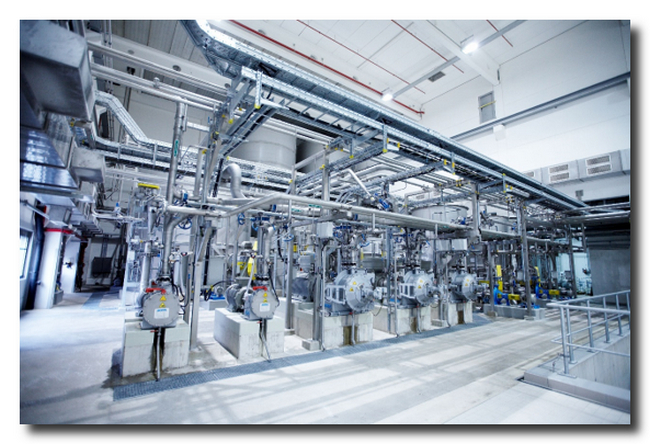 ANDRITZ stock preparation system “Photo: ANDRITZ”.
ANDRITZ stock preparation system “Photo: ANDRITZ”.
Guangxi Sun Paper and ANDRITZ have maintained a close business relationship for many years. Top-quality and energy-saving technology, as well as professional support during the complete project phase, were the decisive factors for once again placing their trust in ANDRITZ.
Since 2005, ANDRITZ has successfully supplied more than 100 stock preparation and paper machine approach flow systems for tissue production mills in China. The order once more confirms ANDRITZ’s strong position in this sector.
Guangxi Sun Paper was established in 2019 to build an integrated pulp and paper mill in Beihai. The mill will be built in two phases over a period of approximately five years. When completed, it will have a total annual capacity of 3.5 million tons of pulp and paper.
ANDRITZ GROUP
International technology group ANDRITZ offers a broad portfolio of innovative plants, equipment, systems, services and digital solutions for a wide range of industries and end markets. ANDRITZ is a global market leader in all four of its business areas – Pulp & Paper, Metals, Hydro, and Separation. Technological leadership, global presence and sustainability are the cornerstones of the group’s strategy, which is focused on long-term profitable growth. The publicly listed group has around 27,100 employees and over 280 locations in more than 40 countries.
ANDRITZ PULP & PAPER
ANDRITZ Pulp & Paper provides sustainable technology, automation, and service solutions for the production of all types of pulp, paper, board and tissue. The technologies and services focus on maximum utilization of raw materials, increased production efficiency, lower overall operating costs as well as innovative decarbonization strategies and autonomous plant operation. Boilers for power generation, flue gas cleaning systems, various nonwoven technologies, panelboard (MDF) production systems, as well as recycling and shredding solutions for numerous waste materials also form a part of this business area. State-of-the-art IIoT technologies as part of Metris digitalization solutions complete the comprehensive product offering.
EU Commission proposals on mandatory reductions risk causing greater uncertainty for industry in case of gas supply disruptions
The European Commission released today the Winter Preparedness Package. The measures outlined in the package respond to the intertwined needs of European citizens and industry, in the face of a deteriorating situation regarding energy supplies. They also introduce a greater level of uncertainty, requiring belated changes to emergency plans previously developed by Member States.
The three documents presented today aim to protect the EU citizens, as well as jobs and the economy as a whole from the effects of the disruption in Russian gas supplies. The pulp and paper industry represented by Cepi plays a fundamental role as a provider of critical products. As its manufacturing partly depends on gas, possible disruptions in the industry’s gas supply would affect the entire logistics of the EU, availability of paper packaging for food and pharmaceuticals, as well as essential hygiene products. In many places, stopping the provision of gas to paper mills would also mean less heat available to district heating networks supplying thousands of people. Moreover, recycling operations in the paper industry are almost entirely based on natural gas. Restricted gas supply would potentially disrupt related waste management operations and Europe’s leading transport packaging value chain supplies, which rely to a high degree on recycled content.
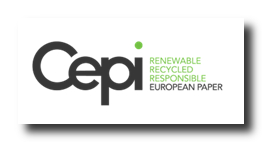 The onus is now on governments to adapt their national emergency plans by end of September in line with the guidance provided by the EU Commission, and allow for a temporary fuel switch where possible. This should include making full use of the flexibility offered by the EU Commission regarding the application of the Industrial Emission Directive. The new communication part of the package clearly states that gas restrictions and rationing are only to be used as a last resort. But an accompanying legislative proposal also released today already contains provisions to enforce such measures, including via mandatory consumption cuts. This creates uncertainty, to which adds the new update of national emergency plans. These already existing plans had until now formed the basis for the industry’s own projections and preparedness plans.
The onus is now on governments to adapt their national emergency plans by end of September in line with the guidance provided by the EU Commission, and allow for a temporary fuel switch where possible. This should include making full use of the flexibility offered by the EU Commission regarding the application of the Industrial Emission Directive. The new communication part of the package clearly states that gas restrictions and rationing are only to be used as a last resort. But an accompanying legislative proposal also released today already contains provisions to enforce such measures, including via mandatory consumption cuts. This creates uncertainty, to which adds the new update of national emergency plans. These already existing plans had until now formed the basis for the industry’s own projections and preparedness plans.
By making full use of the tools offered by the EU Commission, national governments now have a role to play in mitigating the pressures on gas markets before mandatory cuts need to be enforced. But what their reactions would be in case severe gas disruptions were to happen is now unclear. To lower natural gas consumption, Cepi recommends starting curtailment from low-efficiency installations producing electricity or heat only. Combined heat and power generation, also known as CHP or cogeneration and dominant in the pulp and paper industry, uses natural gas in a highly energy efficient manner and is also the most climate-friendly choice. To ensure continuity in the manufacturing of essential products, it is important that Member States also consider entire value chains in their response to the energy crisis.
Finally, national governments must ensure that critical industries, such as pulp and paper, are able to renew gas contracts towards the end of the year at an affordable price. The pulp and paper industry stands ready to voluntarily support national actions outlined by the European Commission, and the market-based solutions proposed, to maintain stable and predictable energy supply.
Quotes
“We call on the national governments to swiftly implement measures ensuring that our industry can keep delivering essential goods in times of crisis. By prioritising the pulp and paper industry, Member States can not only secure the well-being of EU citizens now, but also strengthen the role of green and more energy efficient industries in the future EU economy. The paper industry is a perfect example that this is not about a choice between protecting citizens and safeguarding industrial production.”
Jori Ringman, Director General – Cepi (Confederation of the European Paper Industries)
Valmet introduces new reliability monitoring applications for fiber processing equipment
To enhance predictive maintenance, Valmet is launching new reliability monitoring applications for fiber processing equipment. They are part of the Valmet Industrial Internet offering and provide powerful tools for fiber producers to secure equipment availability and to improve process performance.
“Many fiber production machines operate in extremely harsh environments, and we have had to design and build a robust system. Despite the challenging conditions, we have managed to develop a signal input that previously didn’t exist,” says Heikki Kettunen, Senior Manager R&D, Intelligent Rolls, Valmet. The monitoring system combines modern sensor, signal processing and data transfer technologies applied to fiber production processes.
One of the first commercial applications is Valmet TwinRoll Press Vat Temperature monitoring. The application monitors pulp flow distribution inside the press through temperature measurements and visualizes, for example, the situations when the press gets plugged and pulp flow is disturbed. This application can be used as a standalone input to monitor press plugging or it can be connected to Valmet’s extensive TwinRoll Press performance monitoring systems to secure the overall reliability and washing efficiency of the press.
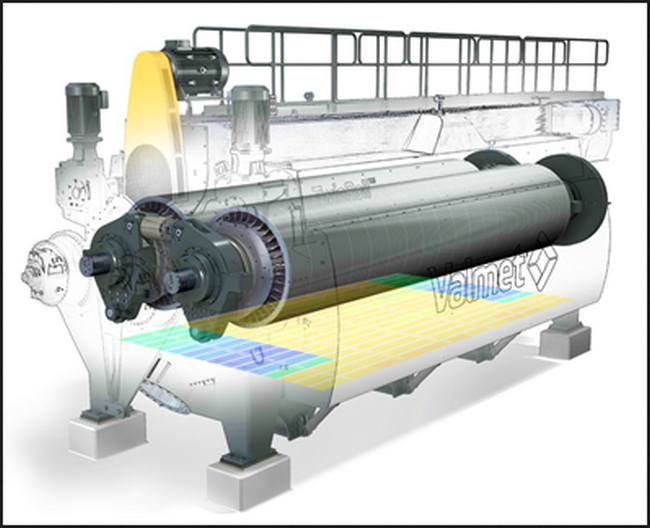 Valmet TwinRoll Press and a temperature map of the vat
Valmet TwinRoll Press and a temperature map of the vat
Another new application is Valmet Feeder Rotor Position Monitoring. To maintain an optimal steady state in the continuous cooking process, low- and high-pressure feeders must provide a stable chip flow in the digester feeding line. The monitoring system visualizes feeder adjustments, identifies impending problems, and supports operators with more accurate adjustments for successful chip feeding.
Modular system design, scalability and connectivity set the path to improved process performance and equipment reliability
Valmet reliability monitoring applications can be installed as a standalone device for single equipment monitoring. “However, this modular platform has been designed with the possibility to expand, which means additional signal inputs can be added, and a connection with other customer systems like mill DCS can be established. These features enable a transition to more comprehensive process reliability and performance improvements,” says Juha Ruotsi, Global Technology Manager, Valmet Rolls and Workshop Services.
Read More:
- Valmet’s new reliability monitoring systems boost predictive maintenance in fiber processing equipment
- Valmet TwinRoll Press Vat Temperature Monitoring flyer
- Valmet Feeder Rotor Position Monitoring flyer
Valmet is a leading global developer and supplier of process technologies, automation and services for the pulp, paper and energy industries. With our automation systems and flow control solutions we serve an even wider base of process industries.
We aim to become the global champion in serving our customers. Our 17,000 professionals work close to our customers and are committed to improving our customers’ performance – every day.
The company has over 220 years of industrial history and a strong track record in continuous improvement and renewal. In 2022, a major milestone was achieved when the flow control company Neles was merged into Valmet. The combined company’s net sales in 2021 was approximately EUR 4.5 billion based on the respective company figures.
Valmet’s shares are listed on the Nasdaq Helsinki and the head office is in Espoo, Finland.
Follow us on valmet.com
ANDRITZ to supply complete OCC line to Shanying Paper (Jilin), China
International technology group ANDRITZ has received an order from Shanying Paper (Jilin) Co. Ltd. to supply a complete OCC line, including fiber recovery and reject handling system, for its mill near Fuyu City, Songyuan, Jilin Province, China. Start-up is scheduled for the second quarter of 2023.
The OCC line will have a capacity of 950 bdmt/d to produce fluting paper. Its special process set-up will meet the requirement for higher efficiency and lower power consumption.
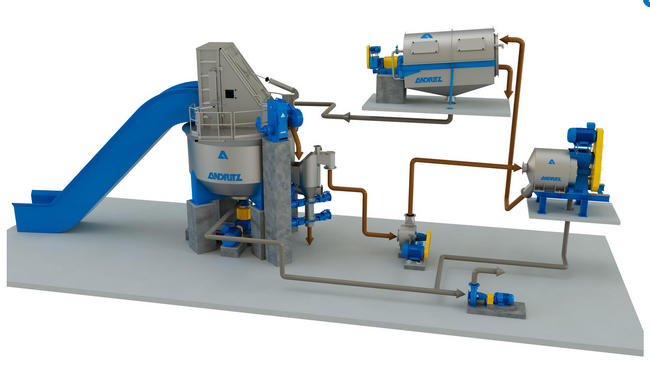 ANDRITZ PrimeSolve LC system as part of the scope of supply © ANDRITZ
ANDRITZ PrimeSolve LC system as part of the scope of supply © ANDRITZ
Yang Zhenliang, General Manager, Shanying Paper (Jilin) Co. Ltd., says: “With this project, we are investing RMB 11.2 billion in the mill’s production of pulp and industrial packaging paper. We will generate about 2,000 new jobs and are targeting an economic and ecological win-win situation by using plant-based agricultural residue of local origin. The professional technology, numerous OCC references and an ideal energy-saving solution were the decisive criteria for us to place the order with ANDRITZ.”
Shanying Paper (Jilin) Co., Ltd. was established in 2018 and produces about one million tons of pulp and industrial packaging paper per year. The company is part of Shanying International Holdings Co., which is a leading enterprise producing various paper products, such as cultural paper, kraft papers, various grades of packaging paper and board, and corrugated cardboard boxes.
ANDRITZ GROUP
International technology group ANDRITZ offers a broad portfolio of innovative plants, equipment, systems, services and digital solutions for a wide range of industries and end markets. ANDRITZ is a global market leader in all four of its business areas – Pulp & Paper, Metals, Hydro, and Separation. Technological leadership, global presence and sustainability are the cornerstones of the group’s strategy, which is focused on long-term profitable growth. The publicly listed group has around 27,100 employees and over 280 locations in more than 40 countries.
ANDRITZ PULP & PAPER
ANDRITZ Pulp & Paper provides sustainable technology, automation, and service solutions for the production of all types of pulp, paper, board and tissue. The technologies and services focus on maximum utilization of raw materials, increased production efficiency, lower overall operating costs as well as innovative decarbonization strategies and autonomous plant operation. Boilers for power generation, flue gas cleaning systems, various nonwoven technologies, panelboard (MDF) production systems, as well as recycling and shredding solutions for numerous waste materials also form a part of this business area. State-of-the-art IIoT technologies as part of Metris digitalization solutions complete the comprehensive product offering.
